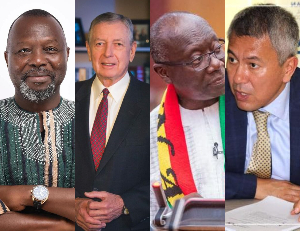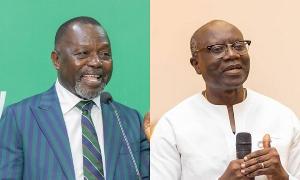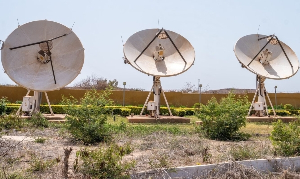By Kofi Ata, Cambridge, UK March 21, 2015
According to the gospel of Rev Prof Emmanuel Martey, the Moderator of the Presbyterian Church of Ghana, prayers can solve the current energy crisis facing the Ghana, commonly known as ‘dumsor’. He believes that if the various religious bodies in the country can come together with one accord and pray to God, the energy crisis will be solved. “Are you a Christian, a Muslim or a traditionalist? Then pray and see what the miraculous God can do within the three months given period. Do you believe in prayers, then let the entire nation pray to witness what God can do”. Rev Martey said these on Adom FM’s flagship morning show “Dwaso Nsem.” (see, “Prayers can solve “dumsor”, Adomonline.com/Ghanaweb March 20, 2015). This was in response to the numerous criticisms of his earlier attack on President Mahama’s failure to solve dumsor with all the loans his government has contracted and a promise that he could end dumsor in three to six months if he were president. This article is an analysis of Rev Prof Martey’s earlier attacks on the government and his proposed solution for ending dumsor.
Preaching at the Akyem Old Tafo Grace Church in the Eastern Region on Sunday March 8, 2015, Rev Prof Emmanuel Martey said he could fix Ghana’s current energy crisis in three months if he was the President of Ghana. “Listen, Ghana is not a big country to fix this problem. In four months you can solve it; at most in six months. If I were in charge, within three months I will solve the problem.” He wondered why the Government is unable to use most of the loans it had contracted or was in the process of contracting to fix the power crisis. “Look at the loans we are borrowing, this is a crisis, why can’t we use the loans to fix it? Then you tell us you will fix it, when? I can fix dumsor in three months” (see Starrfmonline/Ghanweb March 9, 2015).
Ghanaweb was inundated with critical and negative comments on March 9 over Rev Prof Martey’s sermon on March 8, 2015. In fact, I did not want to be believe that he really said what was attributed to him and in a comment said that either he was naive, politicking or did not understand the energy crisis and how to resolve it. However, when I read his response to his critics on Friday March 20, 2015, I was saddened and greatly troubled about Ghana’s future. That, after fifty-eight years of independence, a reverend minister and a professor could seriously believe that if a whole nation prayed, power shortage that has been caused by years of lack o investment, mismanagement, non payment of bills, theft and corruption.
The question is, if by Sunday March 8, 2015, Rev Prof Martey really believed that national prayers could end dumsor in three months, why did he blame President Mahama for not solving dumsor? What was point in questioning why loans have not been used to end dumsor, when in reality all the nation needed to do was to pray and not money? Why did he not blame Ghanaian religious (Christains, Muslims and Traditionalist) leaders for not asking their followers to pray to God to end dumsor for all these years?
Rev Prof Martey’s proposed solution that if all Ghanaians prayed to God dumsor could end in three months only confirmed the suspicion that he had no idea about the root causes of dumsor, let alone the measures to tackle dumsor. His attack on the president was therefore out of ignorance, his proposed solution laughable and ridiculed or reduced him to a person of no substance when it comes to ending the power crisis.
The belief that prayers alone to God will end dumsor is irrational because it is also said that God helps those who help themselves. That means in addition to prayers, all Ghanaians, led by the government must take concrete actions towards resolving the problem. For example, citizens must pay their bills on time, stop illegal connections, Electricity Company of Ghana (ECG) must send bills to customers promptly, its employees must stop making illegal connections for the public and collecting bribes, public institutions must pay for the electricity they use and the government must invest in power generation and distribution in the short, medium and long terms. It would have been reasonable had Rev Prof Marty asked Ghanaians to pray for a cultural shift in their attitude towards non bill payments, illegal connections and corruption.
What really should Ghanaians tell or ask God in their prayers was not clear by the Rev Prof Martey, whether to pray for more rain to fill the Aksombo Dam or for manna to fall from heaven to increase power generation and distribution in Ghana? Even heavy rainfall in Northern Ghana that will raise the water levels in Akosombo to the maximum will only reduce dumsor but not end it in three months. Of course, the rainy season in Ghana is at its peak in May/June so in three months the likelihood of more rainfall and improved water levels in the Akosombo Dam is highly likely. Moreover, some of the short term measures being taken by government would have materialised and the load shedding which is causing dumsor could be reduced considerably or even eliminated. Would Rev Prof Martey claim credit for that because he called on Ghanaians to pray to God?
My concern for Ghana is that not only those in government are bereft of ideas on practical and effective solutions to address the developmental problems of the country but it appears some of those outside government but also occupy positions of trust are no different. No wonder dumsor has become an albatross round the neck of government and the people. Sometimes, when I hear and read about how much businesses and individuals are spending daily, weekly and monthly in fuel to power factories, shops, offices and homes using generators, I wonder if Ghana is still in Africa, where the sun is in abundance and free? Why do they not use the huge sums of money to invest in solar power instead, which would pay for itself in years to come, more sustainable and would not cause environmental damage?
I also question why the government or the Finance Minister has not used tax policies to encourage businesses and individuals who could afford investing in solar power to do so but rather rely on more expensive, unsustainable and environmentally destructive option of generators that rely on petrol and diesel which are in short supply because of lack of finance and when the government owes millions of dollars in arrears to bulk suppliers?
Ghana has a government and a Finance Minister who believe in resolving budget deficits only by increasing taxes and widening the tax net. In the midst of dumsor, the government and the Finance Minister turned a blind eye to the potential investment opportunities dumsor has created in Ghana. For example, one of the immediate short term measures the government could have taken to reduce dumsor is to waive import duties on solar panels and related materials for two years. Again, VAT on the sale of solar panels could be waived for the same period. Such measures would not only boost the imports and installation of solar panels by businesses and homes by those who could afford them but also the economy. It will increase job creation in the sector by increase in the number of unemployed youth to be engaged and trained to install solar panels who will pay income tax on their salaries to replace part of taxes lost to waiving import duties and VAT. The overall impact is that many businesses and homes would become self sufficient in power generation and reduce demand for power from the national grid. The demand for fuel (petrol and diesel) to operate generators in Ghana will reduce as well as reduced demand for foreign exchange to import crude oil or finished petroleum products. Finally, the damage to the environment from generators (noise and carbon emissions) will be reduced. This is a win win tax policy and within two years the tax revenues lost to the state by waiving import duties and VAT would have been less than the quantum gained from job creation, cost of fuel for generators, more power from the national grid for other businesses and homes and increased economic activity from reduced dumsor and less pollution. Yet such a policy has not been implemented. How can God end dumsor in three months? Does the government need the IMF or the World Bank to tell them to implement this simple but cost effective and value for money tax policy?
In fact, historical antecedents make me believe that dumsor has become a weapon in the hands of Ghanaian politicians and none of them are serious about taking effective actions to end it. President Mahama blamed his predecessors with the opposition putting the blame squarely on him. All the opposition party can say to Ghanaians is, “vote out President Mahama in 2016 if you want to see the end of dumsor” without indicating what concrete measures they would put in place to solve the power crisis when given the chance to govern.
For example, on December 4, 2012, just days before the presidential and parliament elections in Ghana, BBC and a UK national newspaper, the Guardian reported that a British company, Blue Energy was to built Africa’s largest solar energy in the Western Region of Ghana with the headlines, “Ghana solar energy plant set to be Africa's largest” and “Africa's largest solar power plant to be built in Ghana” respectively. Ghanaweb also reported the story that same day. According to the reports the 155MW plant worth $400 million would have created 200 permanent and 500 temporary jobs, began power production from 2014 and be completed by October 2015. What happened and was the British company used by the government as part of propaganda tool for electoral gain?
Last Friday, the Charge d'Affaires at the Chinese Embassy in Accra also announced that Chinese Hanergy Group will build $1-billion 400-megawatt solar power plant in Ghana (see “China to build $1 billion solar power plant in Ghana”, Starrfmonline.com/Ghanaweb, March 20, 2015). I read the story with a pinch of salt. Ghanaians should ask China what happened to the $3.5 billion loan to Ghana?
If prayers alone could solve Ghana’s development problems, why have we waited all these years? No doubt, today Ghanaians pollute and destroy waters bodies through illegal mining and still believe that if we all pray to God there will still be clean and fresh water for consumption. May God have mercy on us because the blind is leading the blind in Ghana. Thank God, Rev Prof Martey is only the President of the Presbyterian Church and not President of Ghana.
Kofi Ata, Cambridge, UK
Opinions of Monday, 23 March 2015
Columnist: Ata, Kofi













